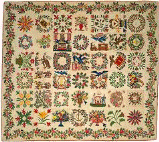Textile Society of America

Textile Society of America: Symposium Proceedings
Date of this Version
2024
Document Type
Presentation
Citation
Textile Society of America 2024 Symposium
Shifts & Strands: Rethinking the Possibilities and Potentials of Textiles, November 12-17, 2024, a virtual event
Abstract
In Sainte Luce, southeast Madagascar, livelihoods are in a state of transition due to climate change, deforestation, shifting local economies and globalisation. Activities passed on by the ancestors are not sufficient to meet everyday needs. In 2012, embroidery was introduced by an NGO as an alternative to the ancestral process of reed-weaving due to declining reed populations. Embroiderers have now formed a 100-strong independent cooperative.
My PhD fieldwork (2017-2019) explored the multifaceted dimensions of change for these craftswomen. In addition to the practicalities of mastering a new craft, they have renegotiated collaborative working patterns, obligations to kin and ancestors, flows of skills around the community and interactions with other livelihoods.
In this paper I explain how embroiderers are developing new methods, aesthetic norms, visual identities and creative methodologies - both individually and collectively. I demonstrate the traces of weaving that are visible in both the construction of designs and finished embroidery. I show how technical skills and vocabulary are being hybridised and localised, and how shared understandings of quality are emerging. I suggest that an important part of this transition, for craftswomen, is renegotiating their relationships with weaving itself. Just as embroidery methodologies have been built on understandings from weaving, the identity of being an embroiderer is layered over existing, and important, identities as weavers. Embroidery is seen as an addition, not a replacement. As Olga, an embroiderer who hadn’t woven for ten years, said, ‘embroidery is good, there is money, but we’re not leaving the mat weaving.’
Included in
Africana Studies Commons, Art and Materials Conservation Commons, Art Practice Commons, Entrepreneurial and Small Business Operations Commons, Fashion Design Commons, Fiber, Textile, and Weaving Arts Commons, Fine Arts Commons, Museum Studies Commons


Comments
Published by the Textiles Society of America
Copyright 2024, the author. Used by permission